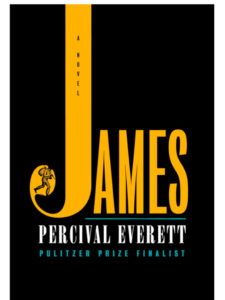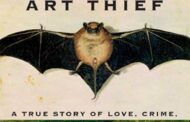BOOOK SHORT
‘James’
by Percival Everett
By Stephanie Miller

It seems only natural that oppressed people will become subversive. In “James,” the enslaved title character in the latest novel from Percival Everett starts out resigned and resilient and emerges outraged and rebellious.
“James” is the retelling of Mark Twain’s “Huckleberry Finn” from the perspective of Jim, Huck’s family slave and sidekick. For Huck in both novels, their rafting trip down the Mississippi is just a lark. For Jim, it is deadly. As Jim told Huck in Twain’s novel, he was quite done with “adventures.”
I found Everett’s premise entirely plausible. James and the other slaves have a closely guarded secret. They speak one way to their white masters and another when they are alone. James himself is quite literate, and far more learned than his enslavers. He understands, for example, that the Bible is a tool to oppress Black people. He has extended internal discussions with Rousseau, Voltaire, and John Locke, sometimes about slavery.
At one point, he realizes that when he’s reading a book, no one can tell by looking at him if he understands it or not. “It’s the ultimate act of subversion,” he thinks. Fellow slaves are shocked but admiring that he keeps a notebook of his story. It’s risky and symbolic – another slave who pilfers a pencil stub for him is lynched for doing so.
Jim teaches his daughter and other young slaves on the plantation how to speak “correct incorrect grammar.” The book describes a clandestine class on why it’s so important to keep their language and knowledge hidden from the whites.
“The children said together, ‘And the better they feel, the safer we are.’
“‘February, translate that.’
“‘Da mo’ betta dey feels, da mo’ safer we be.’
“‘Nice.’”
Diverging from the Original
Everett has made an artform out of re-imagining and reconstructing the stories of American culture. He keeps generally to Twain’s original timeline, but while Twain follows Huck’s story, Everett shines a light on what Jim might be doing when various nefarious characters and events separate him from Huck.
I felt Everett gave Huck a pass. He’s an ignorant, selfish, oblivious child of racist upbringing and the story is indifferent to him, other than when he creates life-threatening situations for James. The denouement of their true relationship felt unnecessary and reaching to me. However, re-telling the tale doesn’t seem to be Everett’s intention. He is telling a new story. In a podcast, Everett says, “Twain could never have written ‘James,’ just as I could never have written ‘Huckleberry Finn.’”
For its intensity and the unflinching portrayal of a dignified, intelligent man’s suffering under but never surrendering to oppression, this book deserves to be read and discussed by us all.
Micro Shorts
by Stephanie Miller
‘The Whalebone Theatre,’ by Joanna Quinn
Cristabel is a fierce, independent, and imaginative four-year-old orphan. Mostly unloved by the feckless adults around her, she is determined to get herself a brother of the knight in shining armor sort. She looks for her aide de camp in her childhood world domination plans. The intensity of her personality compels this delicious family tale through two World Wars, the making of a backyard theater under the bones of a beached whale, and the magic of unconditional sibling friendship. With WW2 in full, ugly force, she and her brother embark on separate missions as British secret agents. Author Joanna Quinn beautifully renders a novel of love, loss, charisma, and self-discovery.
‘Discipline,’ by Debra Spark (Maine Author!)
The mysterious and eerie paintings called “The Triplets” create a circle of tension between three distinct storylines. A young man is pulled from class one day and dropped into a brutal “school” in northern Maine. Another, the daughter of a painter floats lightly through life, trying to preserve and champion her father’s legacy, slowly selling off the paintings to survive. Still another, an appraiser arrives on a remote Maine island and discovers a theft. Fast paced like a mystery with many twists in the tale, this novel reveals how art connects and transforms us.
‘The Wager: A tale of shipwreck, mutiny, and murder,’ by David Grann
The subtitle tells it all. This is a well-researched non-fiction account of the separate returns to England of three different sets of survivors from the warship, Wager. The ship was wrecked off the coast of Patagonia in 1740. Three contradictory stories emerge—each accusing the others of treachery and tyranny. Indeed, the stakes were high, as whomever the admiralty found guilty would hang.
By the author of “Killers of the Flower Moon,” this is an amazing, grand tale of human behavior and survival at the extremes. What these men endured is an incredible story. Imagine hacking out an existence on a barren rock for two years, suffering exposure and scurvy, and watching most of your hundreds of shipmates get tossed overboard or starve. You return home long after your family wrote you off as dead to find that the navy who sent you on this risky adventure doesn’t really want to acknowledge you, let alone pay you back wages or even discuss the folly of the mission that you only survived by luck.





